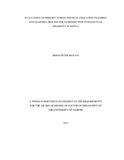| dc.description.abstract | This study is an evaluation of the teaching and learning process for learners with intellectual disability. It analyses how physical education is taught in schools referred to as schools for the mentally handicap. The purpose of this study was to evaluate the teaching and learning process in physical education for learners with intellectual disability. To achieve this purpose, five specific objectives which guided the formation of five research questions were designed. These were based on a five point criteria used to lead this study. They included: rationale, effectiveness, efficiency, relevance and impacts. The target was the 44 schools for leaners with mental handicap in Kenya. The study was an evaluation research. The data for the study was drawn from: an interrogation of the syllabus used to teach in schools for learners with intellectual disability , questionnaires for 31 teachers from the 44 schools for learners with intellectual disability, questionnaires for 30 principals, interview schedules for 240 learners with intellectual disability organised into 31 focus groups, interview schedules for 30 parents of former learners from these schools for learners with intellectual disability and interview schedules for 44 former learners from these schools of learners with intellectual disability. The data from the questionnaires and interview schedules for teachers, principals, focus groups, syllabus document was interrogated. It was found that, in terms of rationale, there is need for proper editing of this syllabus so that it meets the required standards. Basics such as capitalising the beginning of sentences and completion of the document as noted by missing information under heading needs to be taken into account, There is need to realise that the field of physical education, recreation and leisure are distinct areas of study and cannot be equated. The intellectual disabled learner requires physical education as it is correctly stated in the time tables. With knowledge acquired from physical education, the learner can recreate and have leisure. In terms of effectiveness, it was noted that the amount of time allocated to schools needed to be standardized. It was further noted that individualised learning was not practised by the teachers. In terms of efficiency it was noted that funds allocated to various disciplines in the schools for learners with intellectual disability was arbitrarily done without any set criteria and varied from school to school. This may have led to the limited equipment and facilities that in turn could affect the number and choice of activity. Indeed it was noted that the repertoire of activity provided may impact on the experiences that a teacher may be able to be offer. In terms of relevance, the learners seem to have enjoyed the teaching of physical education. In terms of impact, it was noted that most learners who go through the schools for learners with intellectual disability have tended to show positive changes in behaviour. Former learners from such schools have continued to show physical literacy hence confirming the finding that the learners considered physical education their best subject at school. It was concluded that the syllabus needed to be reviewed. It was further noted that learners with intellectual disability takes a keen interest in number work prompting the question whether it is possible that the learner with intellectual disability is still grossly misunderstood and there is need to dig deeper to establish the underlying potential for learners to excel in other areas hitherto not considered such as number work. | en_US |



